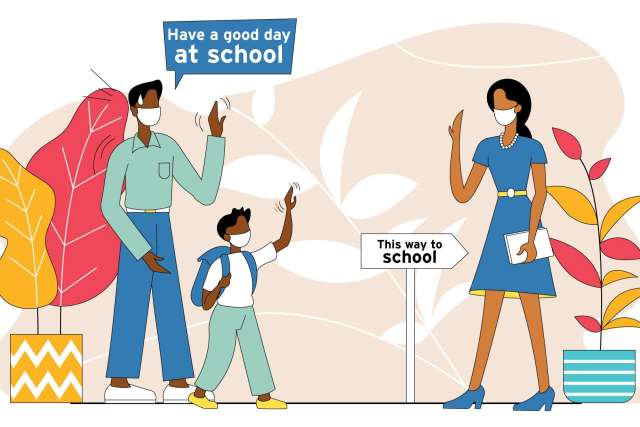For many kids, the thought of returning to the classroom may prompt more than the usual amount of jitters.
Whether they attended class remotely all of last school year or were in the classroom part-time, there’s no question that back to school will look — and feel — different this fall, which can leave children anxious and uncertain.
How can parents make that first day back more comfortable for their elementary school kids? Melissa Brymer, PhD, director of Terrorism and Disaster Programs at UCLA-Duke National Center for Child Traumatic Stress, says communication and preparation are keys to a successful transition.
“Kids will have a lot of questions about what their school routine will be, and parents can help by explaining what the morning drop-off will be like, or here’s where we’ll pick you up, and here’s who will pick you up,” Dr. Brymer says.
Visiting the school prior to the first day to see the layout of the campus and practicing what it’s going to be like can also help eliminate some jitters, she adds.
Anxiety compounded by COVID concerns
Younger students, especially, may exhibit separation anxiety, which is natural after spending a year at home with their parents. For those kids, Dr. Brymer suggests tucking a special picture or toy into their backpack that might remind them of one of their parents, “so they know you’re with them and you’re sharing this together.”
With older children, back-to-school anxiety can stem from not knowing what to expect. For those kids, it’s helpful to remind them that they had those same feelings in previous years.

“Reassure them about the good qualities they found in their teacher or that they got to meet new friends,” Dr. Brymer says. “Talk with them about some of those memories we can help them hold on to.”
Though some back-to-school anxiety is familiar and expected, COVID-19 makes this year unique, Dr. Brymer says.
“Kids will hear adult conversations and may be concerned that it’s not safe to go back to school. We’re going through changes with mask requirements here in L.A. County, so it’s important to explain why those changes are taking place, but more importantly, how masks can keep us safe,” she says.
Children may also worry about getting a family member with compromised health sick. Dr. Brymer recommends talking to them about measures the family has taken to keep everybody safe, whether that’s vaccinations, masks or other precautions.
Talk to your kids in advance about the safety procedures the school is putting in place so they understand it’s being done to keep them and their family safe, Dr. Brymer adds. Bear in mind that, as with everything regarding COVID-19, some flexibility will be needed, she says.
“If there are concerns about safety as it relates to COVID, call the principal and get your questions answered about what safety protocols are in place,” Dr. Brymer says. “Things are changing rapidly, so many people have questions right now. Getting those answers and getting as much reassurance as possible so you feel safe and your kids feel safe is critical right now.”
Ask questions and plan ahead
Pay attention if your child appears withdrawn or anxious, Dr. Brymer says.
“That’s my cue to ask them a few questions,” she says. “Sometimes, as parents, we can say something like, ‘When I had to start first grade, I had some questions. Do you think you might?’ When we put ourselves into the conversations, that often helps kids to say what they’re worried about.”
Importantly, get children prepared for that first day well in advance, she says.
“Sit down a week or two before school starts and talk about when wake-up time is going to be. Do we take a shower or bath in the morning or at night? When do we have breakfast? Do we lay out our clothes? Kids do better when they know what their routines are.”
Then, do some trial runs and make tweaks ahead of time so the first day goes smoother, she says.
At the end of the first week, celebrate the success with a family dinner, game night or a special treat.
“We all need those celebrations right now,” Dr. Brymer says.
Get the latest information on COVID-19 and the vaccine.
Jennifer Karmarkar is the author of this article.



